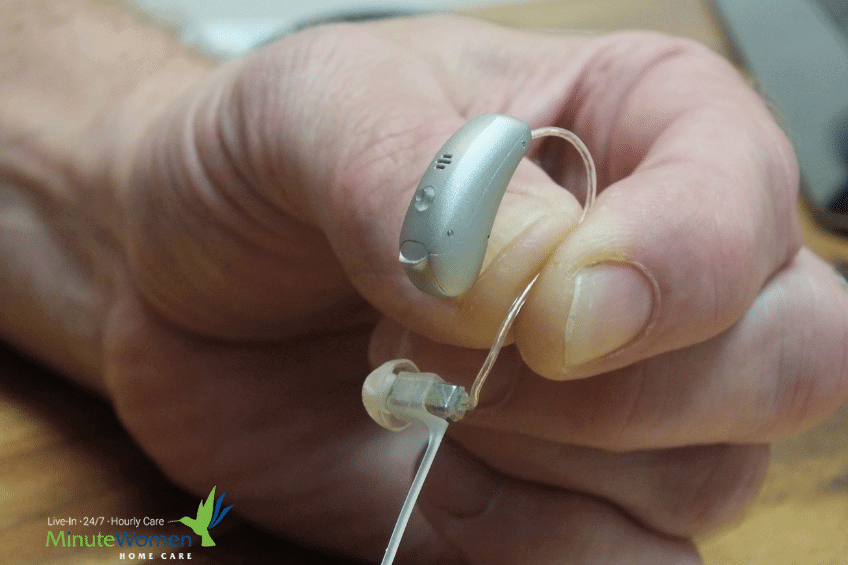6 Signs of Hearing Loss in Seniors
Sound exposure, whether at concerts, loud workplaces, or power tools, adds up over time. It is even possible to begin losing some hearing in early adulthood. Smoking and chronic diseases can change the blood supply to the ear, leading to damage.
The damage tends to be gradual, so you might not notice it. But as someone ages, it gets worse and worse, without the person realizing it. One-third of adults from 45-65 have hearing loss and so do half of those over 75, according to the National Institute on Deafness and Other Communication Disorders. So how do you catch it before it starts affecting your loved one’s quality of life?
Here are six early warning signs of hearing loss in seniors.
1) Your parents are getting frustrated that women and kids don’t speak loudly enough.
High-pitched voices and sounds are where initial problems begin. High-pitched sounds reach the cochlea’s most outer part, where little hair cells pick up sound vibrations and convert them to sound. This area of the ear is the most vulnerable to chronic noise or ear problems.
Other Signs: Trouble heading cymbals, the flute, babies crying, squeals, and birdsongs.
2) Your parents aren’t sure how to track the direction of sounds.
When someone starts talking, people with adequate hearing know instantly where the sound is coming from in the room. Out in the woods, a sharp listener can hear the source of a birdsong. For those with hearing loss, the ability to understand where a noise is coming from becomes much more challenging.
Other Signs: Twisting your neck to see where a sound or a speaker is sitting. Hearing loss can affect one ear more than the other, so getting different sound signals can make it more challenging to understand the noise.
3) Your parents ask you to turn the TV up.
Do your parents ask to turn the volume up on your TV? Turning up the TV is one of the most common signs of hearing loss. When we set the TV’s audio to a comfortable level, that doesn’t mean it’s comfortable for others around us. If one viewer has normal hearing and another does not, it’s obvious who has hearing loss and does not.
Other Signs: Playing an MP3 player so loud that others nearby can hear it as well.
4) Your parents ask people to repeat themselves.
One of the earliest signs of hearing loss comes from asking for clarifications or repetition. Even if you do ‘t notice this problem, your friends and family will.
People may say, “I always have to repeat myself.” “You don’t seem to know what’s going on.” Or they may be more blunt, accusing your parents of being deaf and that they can’t hear.
Spouses often become human hearing aids for those who experience hearing loss. They repeat everything, and they tend to grow frustrated over time.
Other Signs: Mishearing what was said and replying with the wrong response makes a person look sloppy, inattentive, and embarrassing.
5) Your parents lean in closely to hear companions.
When you’re in a restaurant or at a party, you frequently lean in to hear your tablemate or party guest over the laughter, clinking glasses, and music. It can be a frustrating environment to be in for everyone. In extreme cases, the problem could be your parent’s hearing.
It can be tricky to focus on the sounds they want to hear when there’s a lot of background noise. Quieter rooms become more appreciated by the individual. Someone with hearing loss may look more intently at the speaker because of focus. They may try to focus on reading lips or interpreting body language.
6) Avoiding Favorite Activities or Places
People who have trouble hearing often find that they don’t want to go out as much as they become frustrated or embarrassed.
Many people are quick to get glasses when they experience loss of sight, but we’re so much less willing to help when we lose our hearing. Hearing aids have evolved to tune your specific hearing patterns, and newer models are lightweight and inconspicuous.
Key Takeaways
Now that you know many warning signs of hearing loss in seniors, you can look out for it. Many seniors will nod yes when they have no idea what you said, to be polite. If you see some of these warning signs, talk with your parent about it, and work with doctors and senior care solution providers to fix the issue.
Keep an eye out (or an ear) and talk with your loved one about hearing aids. If things worsen, they may need additional private home care.

